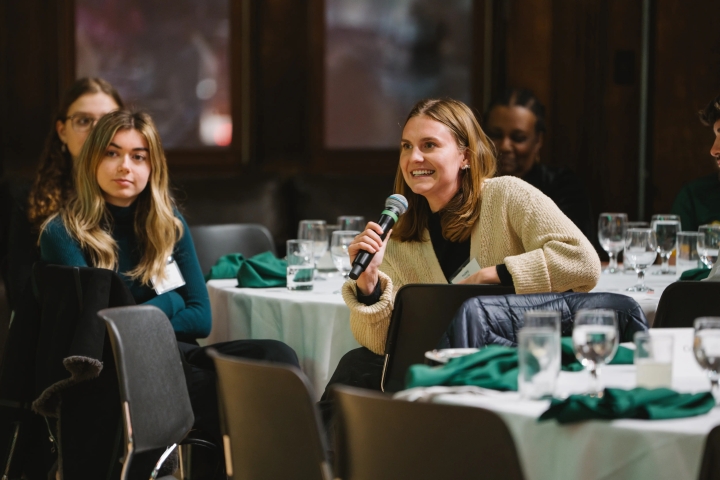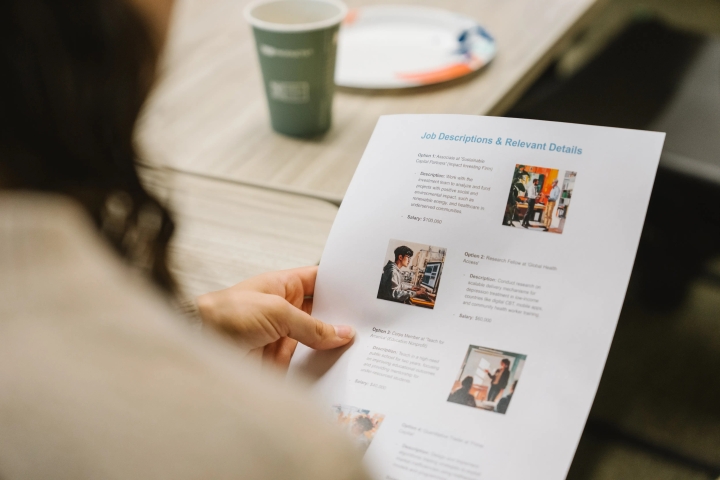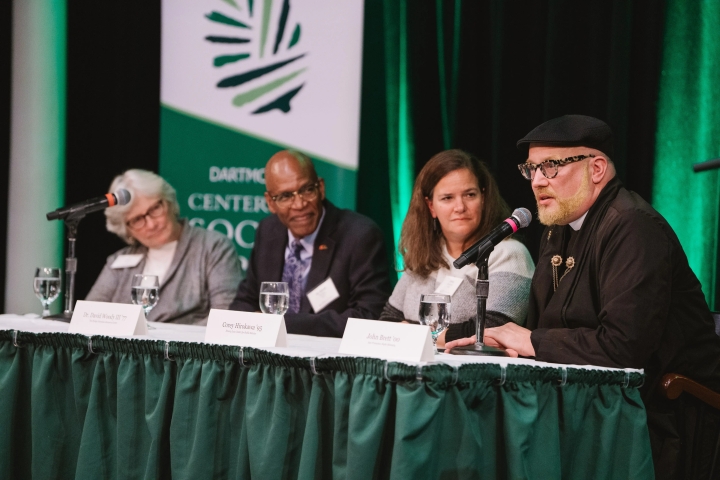Breaking the Mold, a conference hosted annually by the Center for Social Impact, recently brought back to campus leading alumni who have devoted their professional lives to the common good, even in the face of significant headwinds.
“This two-day event is a celebration of Dartmouth’s strong history of educating impact leaders and changemakers,” DCSI Director Tracy Dustin-Eichler told over 100 attendees at Thursday’s keynote dinner and discussion in Collis.
In the aftermath of the Nov. 5 elections, Dustin-Eichler said she could not predict the future, “but just like we’ve showed up tonight, we will show up tomorrow and we will show up the day after that. We will show up for each other in solidarity and support, because the hopes and dreams we have for our community and our world are too important for us not to.”
Assistant Director Henry Do Rosario moderated the discussion among four panelists: Jan Malcolm ’77, Minnesota’s former commissioner of health; David Woody ’77, president and CEO, The Bridge Homeless Recovery Center; Corey Hirokawa ’95, assistant director, Emory Law Center for Public Service; and John Brett ’00, minister and community programs director, San Francisco Night Ministry.
Do Rosario began by asking why they chose to work in government or the nonprofit sector.
“My ‘why’ begins with why I’m here,” said Brett. “I’m here because, vocationally, when you break a mold, you create an opportunity for work in the world that is shaped by what you are rather than by what has been made before that no longer serves.”
To illustrate, Brett shared a highlight from an innovative program he once directed in San Francisco. “We opened up church sanctuaries for unhoused people to sleep during the day, using that space that churches have in a new and creative way when they’re otherwise empty, to meet a need.” An unhoused man Brett helped at that time repaid the favor by giving him, years later, a third place trophy he had won in a recreational basketball league. Brett said that for him, it felt more like a first place trophy.

Woody is taking aim at homelessness in Dallas, where he directs a social service center called The Bridge. Its goal is “to house one person every day, and connect them with a housing solution that they can sustain.” When COVID-19 hit, and Woody saw that unhoused people were low on the priority list for vaccines, he “began writing letters, advocating for guests that I serve. As a result of that campaign, The Bridge was chosen to be the space where unsheltered folks could come to get, at that point, one of the three COVID vaccines.”
COVID-19 presented a different set of unprecedented challenges for Malcolm, in her role as Minnesota’s commissioner of health. “It’s hard to even find words to describe what that was like for people in the trenches of public health and health care delivery,” she said. “There were days when not only could we not please everyone, we couldn’t please anyone.”
But Malcolm refused to let political wrangling sidetrack her mission to protect public health. “We were values-based, we were doing our best, we were following the science as best we could, and that was the north star,” she recalled. “Having a north star, whatever that is, is absolutely necessary when you’re in the midst of inevitable challenges.”
Hirokawa, who practiced public-interest law before moving into her current position at Emory Law School, followed her “north star” by winning a battle with DeKalb County, which resulted in securing, for foster children, the right to legal representation. The victory paved the way for an Office of Child Advocates that became a nationwide model. “I’ve come full circle and some of my students work there now. I love that,” said Hirokawa.
Following the panel, students posed questions about how to launch their own social impact careers while establishing financial independence and avoiding burnout.

“I feel like it’s so difficult to challenge the status quo, like, asking a church to open up during the day for homeless people or making an argument in front of a federal court,” said Julianna Hong ’27. “What’s your advice for convincing people to get behind your cause or persuading people that what you’re doing is something important?”
Woody offered a quick but thoughtful answer.
“Listen and use what you hear, especially for folks who don’t have a voice,” he said. “It’s an amazing thing how, when you think that you’re really stepping out there, there are folks who are even quieter than you, shyer than you, who you pull along and empower.”
And, he added, “Audacity works, too.”
The conference continued the next day with afternoon panels and informal networking with 14 alumni from all over the country. Several will appear as guests in the coming months on the Center’s podcast, All the Difference.


